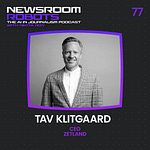From fine-tuning large language models, to discussing modular journalism, to developing an AI tool to help track misinformation, there’s a lot to unpack from this week’s conversation with Alessandro Alviani, the product lead for AI at Germany’s Ippen Digital. We build upon the first part of our conversation from last week, where Alessandro shared his editor-centric approach toward building AI products.
A core takeaway from this week's episode is the value of fine-tuning large language models on a newsroom’s content.
Fine-tuning is the process of taking a pre-trained language model that understands general textual patterns and customizing it by training the algorithm on writings from a specific domain – in this case, Ippen Digital's own journalistic content. By fine-tuning models on Ippen Digital's extensive corpus of local German reporting rather than just using out-of-the-box models like GPT-4, they are working on enhancing accuracy for tasks like headline writing, lead paragraph generation, and article summarization.
Their editors and developers work side-by-side to ensure the AI's outputs match the desired quality standards and editorial voice.
Additionally, Alessandro spotlighted their work in building personalized news experiences enhanced by modular journalism or “intelligent content.” Modular journalism involves breaking down articles into discrete, interchangeable components centered on key semantic themes – historical context, opposing views, critical data, etc. These content blocks can then be dynamically mixed and matched by an algorithm to generate personalized news experiences for different reader interests and preferences.
We also discussed how developing AI assistants to break down a human-written news story into modules can enable the creation of customized article versions matching different reader interests or news products.
Such repackaging of information to cater to diverse audiences is one of the potentials of AI in the newsroom. Thoughtful implementation of augmented writing tools could catalyze more engaging, personalized news without compromising editorial integrity.
Of course, prudent precautions are necessary to develop algorithms in the newsroom. While AI has much potential for accelerating and enhancing reporting, we must understand its limitations in fully automating high-caliber journalism. The heart of quality storytelling – weaving together evidence and narratives to reveal truth and empower civil discourse – remains an irreplicable, fundamentally human endeavor.
Ippen Digital’s stance to develop AI solutions that empower rather than replace reporters seems wise. By bonding human creativity and AI productivity with an ethical approach to automation, journalism may structurally shift yet hold fast to its sacred commitments to transparency, accuracy, and public enlightenment.
🎧 Listen to the full conversation available now on Apple, Spotify, Google, and other major podcast platforms.










